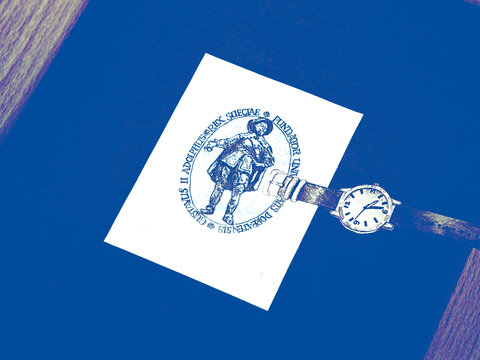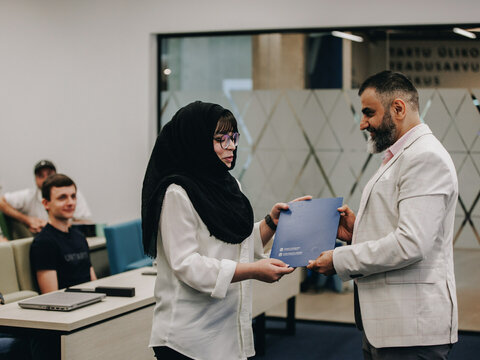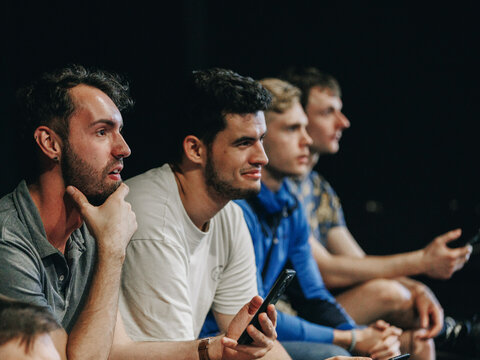Secessionist and Statehood Bids in Times of Crises
-
Credits
3 ECTS (78 hours)
Form of study
Classwork
Location
Tartu
Fee
700 EUR
Teachers
Eiki Berg
Shpend Kursani
Ana-Maria Albulescu
Shpend Kursani
Ana-Maria Albulescu
Study group
Political sciences and civics
Program language
English
Purpose:
This course relies mostly on first hand research and is comparative in nature, with students having the opportunity to explore different cases of secessionist bids from across the world through a combination of teaching, independent work as well as discussions based on various films and a fieldtrip to Narva - a city directly bordering Russia with a Russian-speaking majority population. A separate part of the course will be dedicated to a simulation exercise where students will have the chance to gain first hand experience of negotiation techniques as well as practical knowledge of the Israel-Palestine conflict.Core questions: What do we know about self-determination and sovereignty practices?What works in terms of peaceful and violent strategies as part of secessionist bids?What are de-facto states and frozen conflicts? What can patronage tell us about de-facto states agency? What is the politics of recognition both in terms of its history and current practices? What are counter-secessionist strategies and what does the policy of engagement without recognition entail?What is our understanding of success and failure of secessionist movements?
Target group:
Advanced BA, MA, PhD students
Outcome:
Students completing the course will: - understand the various concepts and theoretical debates related to secession and statehood in International Relations;
-explore and analyse various cases of secessionist bids across the world;
-gain practical understanding of negotiations in self-determination disputes.
Teachers:
Eiki Berg - Professor of International Relations Theory
Programme Director for International Relations and Regional StudiesShpend Kursani - Lecturer in International Relations
Ana-Maria Albulescu - Research Fellow in Peace and Conflict Studies
Content:
| Topic | Credit | Lectors |
|---|---|---|
| 1. Self-determination and Sovereignty Practices Film screening and discussion “How to Start Your Own Country” (2011) |
8 | Eiki Berg, Shpend Kursani |
| 2. Peace and Violence in Secessionist Bids: What Works? Film screening and discussion “Parts of the Circle: History of the Karabakh Conflict” (2019) |
8 | Shpend Kursani, Ana-Maria Albulescu |
| 3. De Facto States and “Frozen Conflicts” Film screening and discussion “PMR: In the State of Limbo” (2014) |
8 | Eiki Berg, Shpend Kursani |
| 4. Patronage and De Facto State Agency Film screening and discussion “Abkhazia: The Long Arm of Russia” (2009) |
8 | Eiki Berg, Shpend Kursani |
| 5. Politics of Recognition Film screening and discussion “The Agreement” (2013) |
8 | Eiki Berg, Shpend Kursani |
| 6. Fieldtrip to Narva | 11 | Eiki Berg, Shpend Kursani |
| 7. Counter-secession Strategies and Engagement without Recognition Film screening “Somaliland: An Experiment in Democracy” (2015) |
8 | Eiki Berg, Shpend Kursani, Ana-Maria Albulescu |
| 8. Success and Failure of Secessionist Movements Film screening “Ghosts of Karabakh” (2021) |
8 | Eiki Berg, Shpend Kursani |
| 9. Simulation exercise. Part I Simulation exercise. Part II |
11 | Eiki Berg, Shpend Kursani, Ana-Maria Albulescu |
Price info:
For the holders of the scholarship, the summer school is free of charge.
Location info:
Tartu linn
Learning environment:
Studies and teaching takes place in appropriate classrooms, which have the required teaching equipment and meet the health and safety requirements.
Schedule and further information:
With wars in Ukraine, Gaza and Nagorno-Karabakh dominating contemporary international relations the study of secessionist bids and the quest for statehood and recognition becomes paramount. Students of International Relations can benefit from a thorough and comprehensive understanding of the concepts and practices of secessionism as well as the way in which these aspects impact the international order.This course highlights fundamental questions of sovereignty and statehood in the context of secessionist conflicts. It offers an insight into the topics such as self-determination and sovereignty practices, survival pathways, incomplete and negotiated secessions. We will also explore the topics of "frozen conflicts" and de facto states and their agency. We then turn to analysing the politics of recognition, counter-secession strategies and engagement without recognition as well as the success and failure of secessionist movements.
Requirements to complete:
To pass the course, participants need to submit all reflections with the "pass" grade. Active participation in all sessions of the program is a prerequisite to pass the course.
Outcome method:
non-differentiated (pass, fail, not present)
Grading method:
Assessment consists of 3 brief reflections: -reflection on the course content (~300 words)
-reflection on simulation (~300 words)
-reflection on the trip to Narva (~300 words)
Grading criteria:
Reflections will be evaluated according to the following criteria:
- sufficient depth of critical reflection on the subject matter and individual learning experience indicated by formulating independent thoughts and relating to previous thoughts/experience
- clarity of conclusions drawn or questions arrived at
- sufficiency of sources used and linkages made to the relevant literature
- contextualization of the reflections (comparisons with or linkages to other cases, debates, courses, life-experiences)
Document to be issued:
Certificate of completion
Tax refund:
No
Additional information:
Ana-Maria Albulescu, ana-maria.albulescu@ut.ee, +372 -
Program code:
SVJS.TK.071
General contact:
Similar lifelong learning courses
Time of occurrence:
02.09.2024
-
29.06.2025
Credits: 12 ECTS (312 hours)
Form of study: Classwork
Language: Estonian
Time of occurrence:
30.08.2024
-
31.08.2025
Credits: 60 ECTS (1560 hours)
Form of study: Partially web-based
Language: Estonian
Time of occurrence:
02.09.2024
-
29.06.2025
Credits: 18 ECTS (468 hours)
Form of study: Partially web-based
Language: Estonian
Time of occurrence:
02.09.2024
-
02.02.2025
Credits: 4 ECTS (105 hours)
Form of study: Entirely web-based
Language: English
Time of occurrence:
16.09.2024
-
24.11.2024
Credits: 4 ECTS (104 hours)
Form of study: Entirely web-based
Language: Estonian





